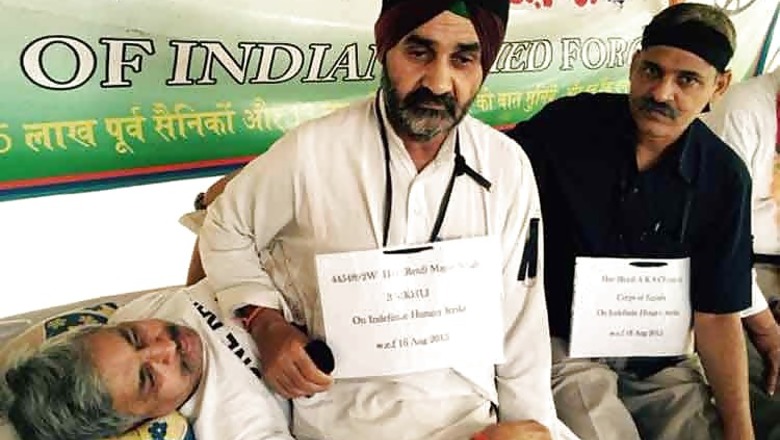
views
A day after ex-serviceman Colonel Pushpender Singh, who is on fast-unto-death, was taken to a hospital, another fasting Army veteran, Havaldar Ashok Chauhan was on Tuesday taken to Army hospital. However, another protesting ex-serviceman, Havaldar Major Singh, who has also taken ill, refused to go to hospital.
Earlier, there was high drama at the protest venue at Jantar Mantar in the national capital as protesting ex-servicemen urged Army veteran to go to a hospital as he took ill due to the hunger strike.
Not conceding to the requests, Havaldar Major Singh had said he would not go to any hospital or end his fast unless the government made an official announcement on the implementation of One Rank One Pension.
Meanwhile, Major Piarchand of 2nd Grenadiers and Naik Uday Singh Rawat of Garhwal Rifles joined the fast-unto-death at Jantar Mantar.
This came even as sources said that the government was likely to announce the implementation of OROP on August 28, on the occasion of the 50th anniversary of the 1965 war against Pakistan.
On Monday, Colonel (retired) Pushpender Singh was rushed to Army Research and Referral hospital after his health deteriorated. He was later shifted to the ICU unit of the hospital.
Expressing dismay at the government's inability to make the announcement on OROP, the protesting veterans have decided to boycott the upcoming celebrations of 1965-war golden jubilee. 63-year-old Colonel Pushpinder Singh (Retd) had said, "We thought Prime Minister may announce at least a date from his speech. But now we are demoralised and it is a huge setback that he didn't say anything. We are sitting on an indefinite hunger strike and it will continue till the OROP is accepted."
Close to 22 lakh ex-servicemen and over six lakh war widows stand to be the immediate beneficiaries of the scheme, which envisages a uniform pension for the defence personnel who retire in the same rank with the same length of service, irrespective of their date of retirement. Currently, the pension for ex-servicemen is based on the Pay Commission recommendations of the time when they had retired.




















Comments
0 comment